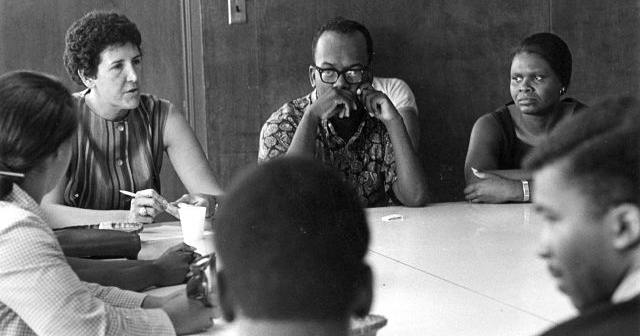Jean Wirth
Visionary educator and counselor
Coordinator, CSM College Readiness Program (1966-69)
“Very quickly I was asked to go to Washington to describe this thing that we were doing. I would always say that I would come, but not without students.”
Jean Wirth never did get the Berkeley PhD she’d planned before stopping out to teach English at College of San Mateo. Yet Wirth did forge electrifying new paths for teaching and learning, including CSM’s College Readiness Program for students of color. Her career illustrates the intersectionality of all rights movements.

Wirth (1932-1996) was the child of an Army doctor and was raised with two deaf, nonspeaking grandparents. She grew to be six-foot-five — no one knew why — and one CSM beneficiary of her talents, disability rights pioneer Ed Roberts, speculated that Wirth’s height put her “through a lot of similar things about being an object, in a way.”
In 1958, midway through her doctoral studies, Wirth began teaching at CSM. It was her first job. Though CSM was then at its rustic Coyote Point campus, studded with potholed roads and broken pipes, Wirth and all female staff, following the custom of the times, were required to wear skirts or dresses, nylon stockings, pumps and girdles.
Wirth gave students her complete attention. When Roberts, a quadriplegic, transferred to Berkeley, she and CSM Dean of Students Philip Morse drove him there personally to scout a place to live and helped secure his funding. Wirth nurtured other disabled students and got the first disabled-access ramps and curb cuts installed on CSM’s campus. Roberts’ mother, Zona, was the first of many re-entry women Wirth prodded to enroll.
“I said something about what I’m going to do, and she said, ‘Well, I think you’re going to college. I think you’re going to start right now,’ ” Zona Roberts told an interviewer for UC’s Bancroft Library.
When college President Julio Bortolazzo sought faculty volunteers in 1966 to help expand Black access to learning, Wirth answered the call.
She coordinated CSM’s College Readiness Program, a holistic support system that included culturally relevant English classes, work-study jobs, intensive tutoring and counseling.
“We were more successful than anyone could have dreamed,” Wirth told the Bancroft Library. “It had something to do with me and the other people working in the program, but it had mostly to do with the fact that the nation and the world [were] ripe and people were ready.”
When Bortolazzo’s successor curtailed the program three years later, Wirth left CSM. She went to Washington, D.C. to help implement Student Special Services, a then-new federal Title IV program that funds initiatives to support at-risk learners.
“Those of us who were involved in such things knew that they didn’t do very well because they ran into an absolute brick wall of racism and all kinds of other things,” Wirth said. “So what Student Special Services paid for was whatever the college or university felt was necessary to see to it that they kept their disabled and their students of color and their poor students and guided them through.”
From 1971 to 1985, she ran a tiny independent school out of her Woodside home. Dubbed Common College, it offered personalized learning and mentorship in subjects from pre-law to carpentry. A typical student project was the first published guide to California foundations, giving grassroots organizations access to information about philanthropic money.
As a consultant and grant writer, Wirth raised $30 million for youth development programs in East Palo Alto.
“Jean honestly believed that everyone was bright,” said CRP alumna Sally Smith upon Wirth’s death in 1996. “She could bring out some talent in every student she ran into.”

